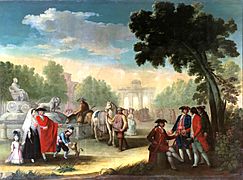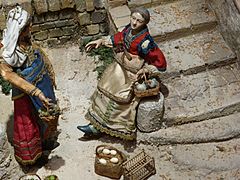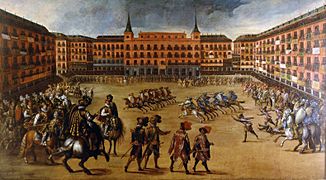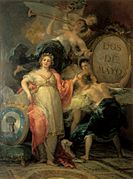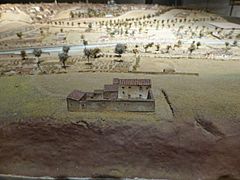Museo de Historia de Madrid facts for kids
| Museo de Historia de Madrid | |
 |
|
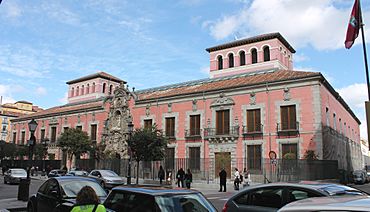
View of the museum from Calle Fuencarral
|
|
| Established | 1929 |
|---|---|
| Location | Real Hospicio de San Fernando, Calle de Fuencarral 78, Madrid, Spain |
| Type | History museum |
| Owner | Ayuntamiento de Madrid |
| Public transit access | Tribunal |
The Museum of History of Madrid (Spanish: Museo de Historia de Madrid) is a cool place in downtown Madrid, Spain. It tells the story of this amazing city! You can learn all about Madrid's past, from when it became Spain's capital in 1561 up to the early 1900s. It first opened in 1929 as the Museo Municipal and got its current name, Museo de Historia de Madrid, in 2007.
Contents
A Look Back: The Museum's Story
From Hospice to History Museum
The building where the museum is today has a long history itself! It was originally built in 1673 as the Royal Hospice of San Fernando. A hospice was a place that cared for people in need. A famous Spanish architect named Pedro de Ribera designed this beautiful building.
The museum first opened its doors in 1929. Back then, it was called the Museo Municipal, which means "Municipal Museum" or "City Museum." It closed for a while in 1955 for some big updates and didn't open again until 1978.
In 2007, the museum was given its current name: the Museo de Historia de Madrid.
Exploring Madrid's Past: The Museum's Collection
The museum's permanent collection shows the history of Madrid. It covers the time from 1561, when Madrid became the capital of Spain, all the way to the early 1900s.
The collection is split into three main parts:
- Madrid, Town, Court, and Capital of Two Worlds: This part covers the 16th, 17th, and 18th centuries. It shows what Madrid was like during its first two centuries as the capital of Spain.
- Madrid, Enlightened Center of Power: This section focuses on the 18th century, leading up to the War of Independence. It explores the time of the Borbon royal family and how the government changed.
- Madrid, The Dream of a New City: This last part looks at the 19th century, right up until the First World War. It shows how Madrid grew and changed into a modern city.
Gallery
-
Fiestas en la Plaza Mayor de Madrid, by Juan de la Corte.
-
Allegory of the City of Madrid by Francisco de Goya, 1810
See also
 In Spanish: Museo de Historia de Madrid para niños
In Spanish: Museo de Historia de Madrid para niños
 | Calvin Brent |
 | Walter T. Bailey |
 | Martha Cassell Thompson |
 | Alberta Jeannette Cassell |


